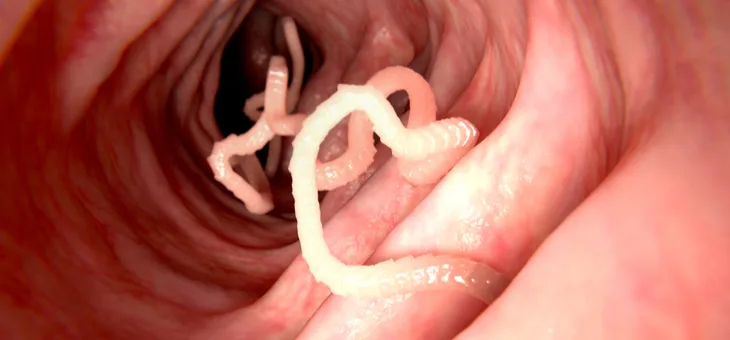Normally when we talk about parasites living on our skin and in our body, thoughts turn to the nasty damage they can cause and ways to get rid of them.
However, new research has found that ridding our bodies of some of these parasites may be doing more harm than good.
According to the review article, some parasites contain anti-inflammatory properties that could help prevent ageing in their host and also help them fight chronic disease and live longer.
The review looked at the growing evidence to suggest that losing parasitic worms, which used to live relatively harmlessly in our bodies, can cause ageing-associated inflammation and raises the possibility that carefully managed treatments could prevent ageing and protect against heart disease and dementia.
Study author Bruce Zhang explained that a decline in exposure to these microbes and parasites in developed countries was linked to increased prevalence of allergic and autoimmune inflammatory disorders.
He said that a further possibility was that the loss of these parasites increased ageing associated inflammation known as inflammageing.
Inflammageing is increasingly thought to be a contributory factor to the major diseases of later life, including heart disease, dementia, cancer, chronic obstructive pulmonary disease, osteoporosis and age-related eye disease.
Co-authors Professor David Gems and Mr Zhang reviewed the evidence for parasite therapy in two areas: treating known inflammatory disorders, such as coeliac disease, and stopping or reversing inflammageing as part of the ageing process.
They revealed how the loss of parasitic worms has so far been linked to a range of inflammatory diseases, including asthma, atopic eczema, inflammatory bowel disease, multiple sclerosis, rheumatoid arthritis and diabetes.
Some studies have shown that natural infection with parasites can alleviate disease symptoms, for example, in multiple sclerosis and eczema, while other studies in animal models suggest that intentional infection with parasitic worms could have benefits against disease.
The article found that the safer, and perhaps more palatable, option was the use of proteins derived from the effective parasites to achieve the same therapeutic benefits.
This was tested recently in mice and shown to prevent the age-related decline in gut barrier integrity usually seen with a high-calorie diet.
It also had beneficial effects on fat tissue, which is known to be a major source of inflammageing.
The authors speculate that if parasitic worms have anti-inflammageing properties you would see lower rates of diseases related to inflammageing in areas where infection was common, and they found some evidence to support this theory.
A region in Eastern India endemic for lymphatic filariasis caused by filarial worms, not a single person with rheumatoid arthritis tested positive for circulating filarial antigens, whereas a much higher proportion (40 per cent) of people without rheumatoid arthritis tested positive for the infection.
“It goes without saying that improvements in hygiene and elimination of helminth (worm) parasites have been of incalculable benefit to humanity, but a cost coupled to this benefit is abnormalities of immune function,” Prof. Gems explains.
“In the wake of successes during the last century in eliminating the evil of helminths, the time now seems right to further explore their possible benefits, particularly for our ageing population – strange as this may sound.”
Do you think clean living has helped or hindered longevity in Australia?
If you enjoy our content, don’t keep it to yourself. Share our free eNews with your friends and encourage them to sign up.

